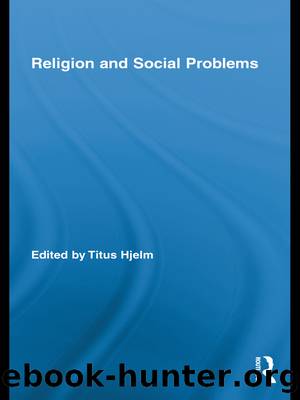Religion and Social Problems by Titus Hjelm

Author:Titus Hjelm [Hjelm, Titus]
Language: eng
Format: epub
ISBN: 9780415849296
Barnesnoble:
Publisher: Taylor & Francis
Published: 2013-12-11T00:00:00+00:00
Contemporary Debate over the Arizona Governorâs Immigration Law SB 1070
In order to fight what they believe is the criminalization of Latin American immigrants in particular and Latinos in general, Mahony and Rodriguez have taken to the streets again to protest the Arizona Governor Jan Brewerâs SB 1070, which was signed into law April 23, 2010. The new law, one of the strictest in the U.S., would enable law enforcement officials and the courts to identify, prosecute, and deport illegal immigrants. The Governor and her supporters stated that the law was put into effect because President Obama and Secretary of the Department of Homeland Security Janet Napolitano did nothing to secure the border with Mexico and protect Americans from violent drug-cartel related crime, the murder of Arizona ranchers and the kidnapping and rape of young women by undocumented immigrants, and because nothing was being done to curtail the flow of the estimated 460,000 undocumented immigrants in Arizona. Brewer stated that the new law ârepresents another tool for our state to ⦠solve a crisis we did not create and the federal government has refused to fix.â She went on to state the new law âprotects all of us.â The new law requires state and local police officers to detain and arrest immigrants unable to provide legal documentation and it also makes it a crime to transport and hire undocumented and day laborers. This does not mean they would stop every Latino, just those with âreasonable suspicion.â This law is part of a much larger and quieter wave of immigration reform sweeping across the U.S. wherein since 2007 hundreds of laws or bills have been proposed and/ or passed. In 2009 alone, over 222 immigration laws were enacted and 131 resolutions have been passed in 48 states, most of them conservative in nature (Schwartz 2010: 1â2; Archibold 2010: 1â4).
The struggle over immigration reform and the criminalization of Latin American immigrants as law breakers and a group that engages in other criminal activity disproportionately per their percentage of the U.S. population may also have distinct racial undertones and implications, which if not properly addressed may in turn lead to greater racial tensions in the future. The distinction between a tiny criminal element (which can be found in any large population) and the larger population of largely law-abiding immigrants is often overlooked. While the larger goal of stopping drug cartels, kidnappers, and organized crime is laudable, by not always making careful distinctions, it nonetheless also results in a kind of de facto criminalization of an entire population and class of people, creating a perennial âOtherâ and a subpopulation thereafter classified as a social problem.
This is no doubt part of the reason why the political and public outcry to the Arizona law was immediate. President Obama called the new law âmisguidedâ and strategically sought to capitalize on the event by arguing that this law proved that what was really needed was comprehensive immigration reform, which detractors have called general amnesty. Latino civil rights activists like
Download
This site does not store any files on its server. We only index and link to content provided by other sites. Please contact the content providers to delete copyright contents if any and email us, we'll remove relevant links or contents immediately.
The 5 Love Languages: The Secret to Love That Lasts by Gary Chapman(9782)
The Space Between by Michelle L. Teichman(6927)
Assassin’s Fate by Robin Hobb(6197)
Wiseguy by Nicholas Pileggi(5766)
Everything Happens for a Reason by Kate Bowler(4729)
Gerald's Game by Stephen King(4638)
Pillow Thoughts by Courtney Peppernell(4271)
A Simplified Life by Emily Ley(4156)
The Power of Positive Thinking by Norman Vincent Peale(4053)
Harry Potter and the Prisoner of Azkaban (Book 3) by J. K. Rowling(3346)
Resisting Happiness by Matthew Kelly(3336)
Girl, Wash Your Face by Rachel Hollis(3275)
Being Aware of Being Aware by Rupert Spira(3272)
The Code Book by Simon Singh(3174)
The Secret Power of Speaking God's Word by Joyce Meyer(3163)
More Language of Letting Go: 366 New Daily Meditations by Melody Beattie(3017)
Real Sex by Lauren F. Winner(3006)
Name Book, The: Over 10,000 Names--Their Meanings, Origins, and Spiritual Significance by Astoria Dorothy(2971)
The Holy Spirit by Billy Graham(2939)
